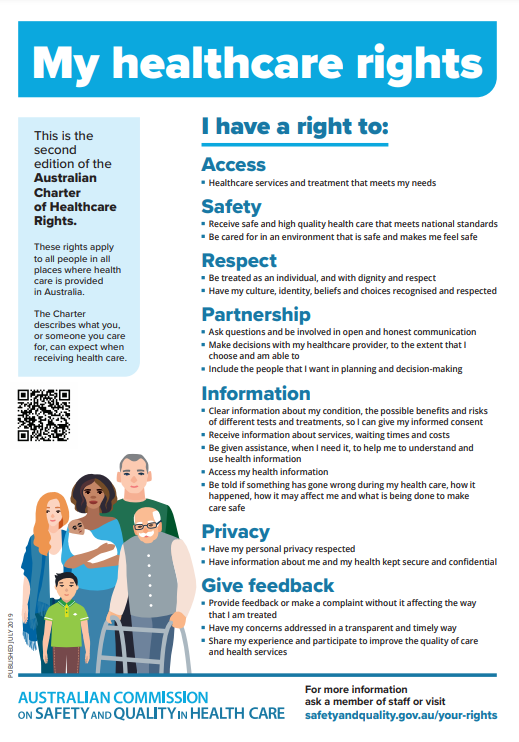Healthcare rights and informed consent
Action 2.02 |
|---|
|
The healthcare service:
|
Action 2.03 |
|---|
|
The healthcare service has processes to identify:
|
The Commission is now operating in accordance with the Caretaker ConventionsExternal link pending the outcome of the 2025 federal election.
Action 2.02 |
|---|
|
The healthcare service:
|
A healthcare service’s charter of rights describes the rights that consumers, or someone they care for, can expect when receiving health care. The healthcare service’s charter of rights should be consistent with the Australian Charter of Healthcare Rights (second edition), as illustrated in Figure 4.
In using a charter of rights, your healthcare service ensures that the seven healthcare rights described are upheld in the planning and delivery of health care. This includes informed consent, which is a person’s voluntary decision about their health care that is made with knowledge and understanding of the benefits and risks involved.
Figure 4: Australian Charter of Healthcare Rights (second edition)

Informed consent is a person’s decision, given voluntarily, to agree to a healthcare treatment, procedure or other intervention that is made:
For there to be valid informed consent, the person consenting must:
Links to Actions 2.03 Healthcare rights and informed consent
Develop or adopt a process for informed consent by patients. This should include how the healthcare service:
Action 2.03 |
|---|
|
The healthcare service has processes to identify:
|
According to the legislation of every Australian jurisdiction, all adults are presumed to have the capacity to make decisions about their care.
A policy on identifying substitute decision-makers is required for patients whose decision-making capacity is limited or fluctuates. Substitute decision-makers are involved in decisions about a patient’s care.
If a patient does not have the capacity to make decisions about their own care, a substitute decision-maker may be nominated. Examples of substitute decision-makers are a nominated carer, a health attorney or a person nominated under an enduring power of attorney or guardianship arrangement.
A person has capacity to make a decision about their care if they can:
This means that a person’s capacity can vary at different times, in different circumstances and between different types of decisions. The healthcare service should identify patients who do not have the capacity to make decisions about their own care and should implement a system to identify:
The type and comprehensiveness of evidence used is dependent on each healthcare service context, but could include:
The principles and strategies outlined in these resources are broadly applicable.